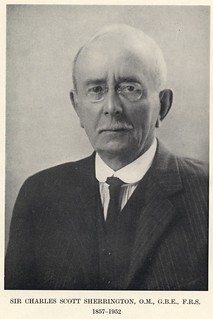Related to  Walter Holbrook Gaskell
Description:
Walter Holbrook Gaskell
Description: 'So busied have I been that I could not get to your note about Gaskell. He was always an inspiration to me, & to any work I was able to try. Such inspiration is often subtle & part of its success springs I imagine from its subtlety. One does not like to be driven, but inspiration is not driving. My own work began by chance at the wrong end - the cortex-pyramidial degenerations etc. It was certainly through Gaskell that I very soon felt that. One could not talk with him long without realizing that the cord offered a better point of attack physiologically. Also, that the cord is originally and still must be a chain of 'ganglia', as he would say, thinking of invertebrates. The spinal afferent root should show the limits of, & at least part of the make-up of the metamerism - functional as well as morphological. But when one got on with that, came the stumbling block, i.e. that in the vertebrate the segments as judged by the skin-afferents had overflowed into one another. But at the same time you showed the visceral segmentation & how it had persisted in purer form. I remember how pleased he & I were about your observations & results. He had expected it would be something like that. He had always insisted to me that the bulb-segmentation was more primitive than the spinal. But the bulb lent itself less to laboratory experiment.
Later too, when his own chief interest had passed to the origin of vertebrates, he was still always a bulwark to me about inhibition of voluntary muscle. To both him & me it always seemed that the taxis of voluntary muscle was impossible without inhibition. But we both expected efferent inhibitory nerves to them. You remember his vivid interest in Biedermann & the Astacus claw. I used to search for similar things in mammal muscle-nerve. I used to put down - he agreeing - each failure to a swamping of the inhibitory fibres by exitatory mixed in the same efferent nerve. Gradually, in view of one's reflex experiments, it burst upon me that for the vol. muscles, the inhibitories play not on the muscle direct but on the spinal motor cells driving them, & in that sense are all afferent or central. When I told him how things were pointing, he came out of his own work, though up to his neck in it then, & into my story & all its pros & cons, not stinting time for it. Finally he said yes; of course, here again the somatic part of the segment is less primitive; visceral muscle's inhibition is peripheral, but skeletal muscle's inhibition has become central! That gift of sympathetic attention, & [illeg] switching switching off from his own problem to a pupil's was characteristic of his nature. And his transcendent sincerity lent such force to his criticism or adhesion. He personified truth. In a hundred ways I owe him help & inspiration.
I wish that, when this is over, some adequate account of him & his influence may appear; no proper appreciation of him has been given yet.'










